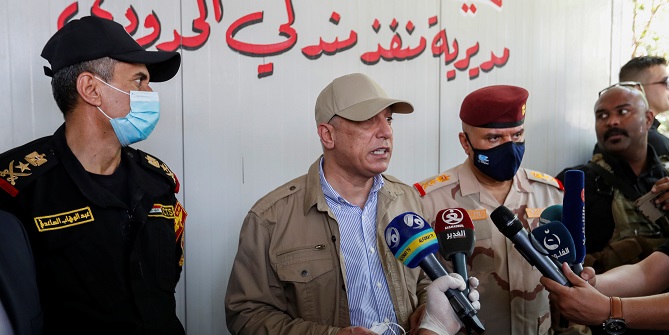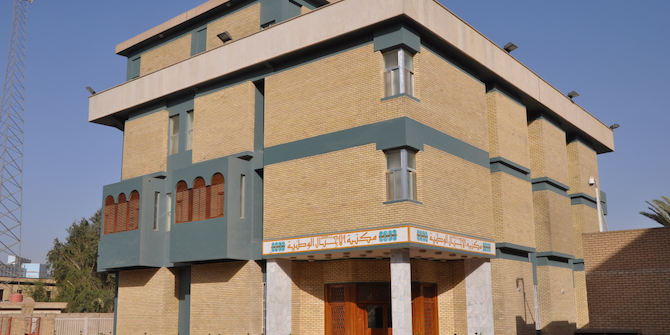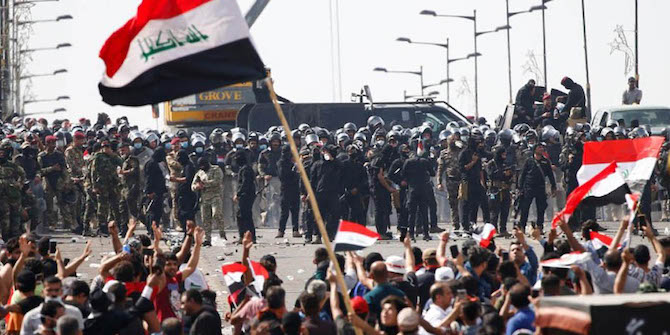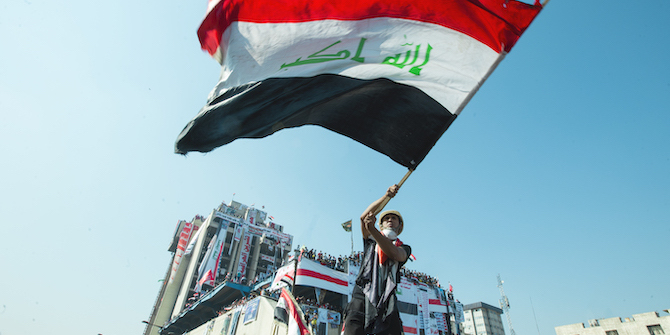by Omar Al-Nidawi
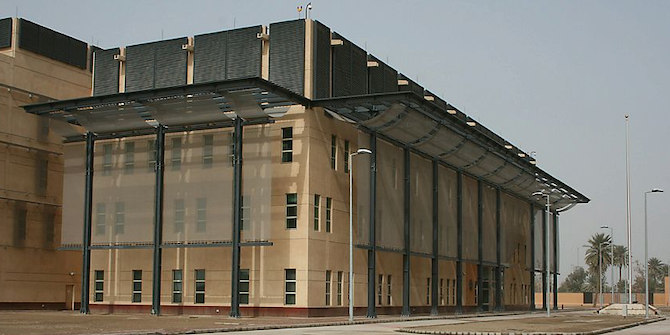
Secretary of State Mike Pompeo’s threat to close the American embassy in Baghdad exposes a dangerous dichotomy in the Trump administration’s Iraq policy. Less than six weeks ago, the administration gave visiting Iraqi Prime Minister Mustafa al-Kadhimi and his colleagues a warm reception, offering support to help the Kadhimi government cope with Iraq’s severe economic crisis, prepare for early elections, respond to the COVID-19 pandemic, and assert greater state control over security institutions, which have been compromised by the encroachment of pro-Iran militias. The episode reflected an appreciation of Baghdad’s dilemmas, particularly its struggle to prevent escalating tensions between the US and Iran – the most powerful external actors in Iraq – from engulfing the country.
Six weeks is not much time for underlying conditions to change. Even though Baghdad has not found an instant solution to its militia problem – a challenge that bedevilled US–Iraq relations long before Trump or Kadhimi assumed office – the Iraqis have been busy arresting suspected militia financiers, asserting control over borders, and strengthening the country’s formal military chain of command.
Bullying friends of the United States to do what they cannot at a time of multiple crises reflects more impulse than strength. How did we get here, and what caused Pompeo to issue such a threat, which stands to harm US and Iraqi interests, while potentially giving Iran what it sorely wants?
By threatening disengagement if Kadhimi fails to prevent militia attacks on US interests, when these same militias have been killing Iraqi civilians, the administration is pressuring Iraq to do what is currently beyond its capacity, and it knows that. The August meetings showed that the administration understands very well the limits of what Kadhimi can do against Iran-backed militias like Kata’ib Hezbollah. These militias have their tentacles in every branch of the government, have murdered activists and allies of the prime minister to intimidate and silence opposition, and recently stationed thousands of armed members on the prime minister’s doorstep. These obstacles to action have not changed in the last six weeks.
Combining the embassy closure with a threat to target pro-Iran Iraqi militias won’t bring about a change in the behaviour of Iran or its allied militias. While fear of American strikes prompted mainstream leaders with economic and political stakes to protect, like Moqtada al-Sadr and Hadi al-Amiri, to denounce attacks on diplomatic missions, more militant groups like Kata’ib Hezbollah and Harakat al-Nujaba threatened more precision attacks. The latter groups do not appear deterred, even with the drone strike that killed Qassim Soleimani and Abu Mahdi al-Muhandis still fresh in their memory. Indeed, the strike did not succeed in deterring militia attacks on US interests, nor did it otherwise compel Iran to change its behaviour.
There are no good outcomes from threatening to close the embassy, should Washington insist on this position. If the threat pushes Kadhimi to take military action against the militias when his defence apparatus is not yet ready, he will likely fail and the episode will have handed the militias a golden opportunity to take him down. On the other hand, if Kadhimi fails to act, the militias will strike American interests again and Washington will have to order the embassy to close. That, in one stroke, would hand Iran a victory it could only have dreamt of until now. Evacuating American diplomats from consulates, one after another, in the face of Iranian threats communicated weakness; closing down the embassy would be a declaration of defeat.
Citing security threats to justify closing the embassy is not a valid argument, nor is any comparison with Benghazi. The embassy in Baghdad is a fortress, built and equipped specifically for war conditions, including the state of the art C-RAM defence systems. The US didn’t shut down its diplomatic missions in 2006 when militias and al-Qaeda alike lobbed many more rockets and mortars at them on a daily basis. Nor did Washington deem it necessary to shut down the embassy in 2014 when ISIS had occupied a third of Iraq and was on Baghdad’s doorstep.
It is impossible to tell whether the threat to close the embassy was an expression of frustration with conditions in Iraq, or had cynical political motivations related to the November election. Regardless, this move is dangerous and broadcasts a message of weakness to America’s adversaries. Abandoning Baghdad, closing our largest, most expensive and most-protected embassy and ordering a few drone strikes on militiamen is not strength. This would stand as a mistake giving Iran a major strategic advantage in Iraq and beyond, and coming at a great price to both US interests in the region and our standing in the world. It would tell Iran and America’s stronger adversaries that if you push us hard enough, America will cut and run. For Iran, the cost is a handful of Katyusha rockets and homemade bombs. Washington would be wise to reconsider its position and give the budding relationship with Iraq’s new government the chance it needs to succeed.



